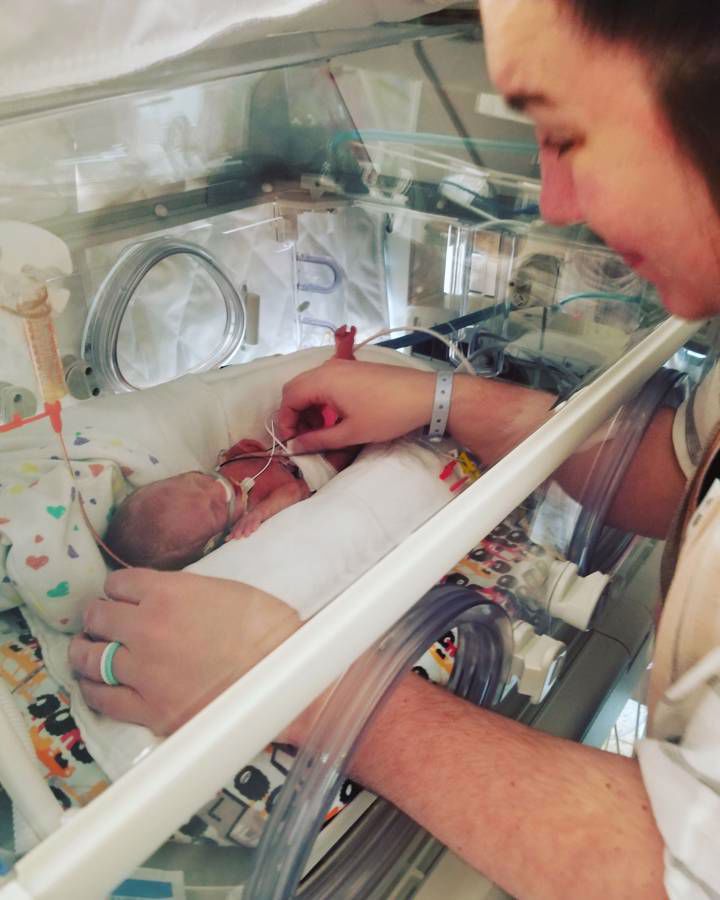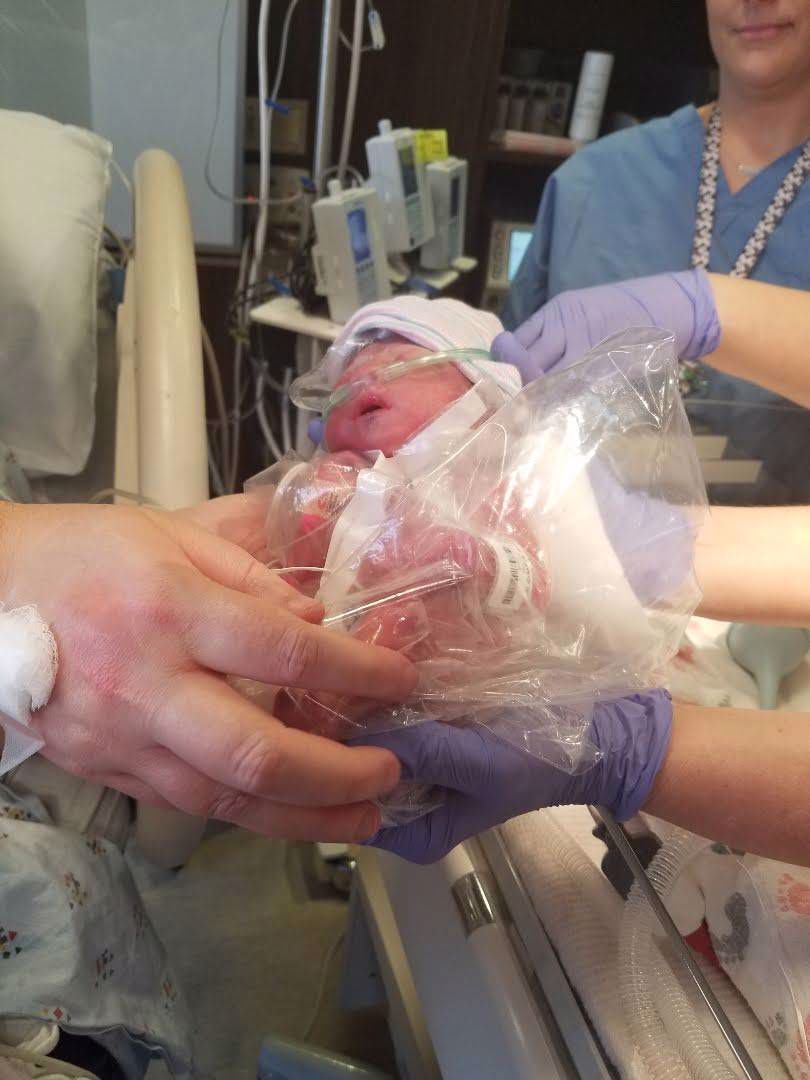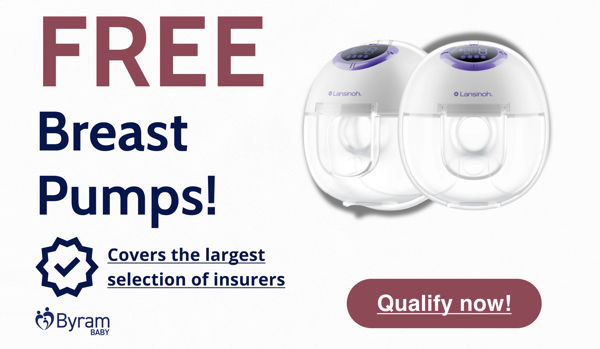
I had heard the term “NICU” used a few times prior to 2019. I have a cousin that is a nurse in the NICU at Nationwide Children’s Hospital in Columbus, Ohio -- and I knew she worked with babies -- but, I still did not know what a NICU truly was -- until my son had to spend 92 days in one.
NICU (Neonatal Intensive Care Unit) is essentially a unit in a hospital used for newborn babies that are needing some kind of assistance due to issues during birth or prior to birth. It is an intensive care unit for newborns (hence the name). I have heard some people call them newborn ICUs -- which is true -- but, they are so much more than that.
A NICU in a hospital will be based different levels -- I, II, III, & IV. The level of the NICU basically means what that NICU can treat or do for a baby at born at different stages of gestation or treat the different issues that a newborn may have.
For instance, a Level I means that the baby being cared for is a healthy newborn baby. You will not see a baby that was born prematurely in this level of a NICU. Level IV is the highest level NICU -- and those NICUs can not only treat the most critical of babies, but also have all the equipment on hand to treat whatever issue a baby may be facing. Level III & IV NICUs have a lot of benefits to them -- they are both able to perform surgeries and can save the life of a baby born before 32 weeks gestation -- the largest difference between a Level III & Level IV is the equipment & the type of surgeries able to be performed. I could be wrong on this -- but, here in the US -- a dedicated Children’s Hospital is going to most likely house the most Level IV NICUs.

Our son was born at 26 weeks + 4 days gestation -- which makes him a micro-preemie -- or a baby born in the second trimester of pregnancy (and also a baby born weighing less than 2 pounds is considered a micro-preemie). He was born at West Penn Hospital in Pittsburgh, PA and was in their Level III NICU. He needed specialized care -- more care than the average preemie because micro-preemies are very underdeveloped. Their lungs are not fully developed, and because of this will need respiratory support -- and their bodies are tiny (our son, Luke, was born at 2 pounds 2 ounces, but he quickly went down to 1 pound 10 ounces for his first almost 30 days of life). A micro-preemie may end up having a lot of different long term issues from respiratory, eye development, cerebral palsy, and developmental delays, just to name a few.
I will easily confirm that the NICU was the absolute scariest experience of my life. You really just don’t know what to do while you are in there -- and at the end of the day, there is nothing you can do but be there. A parent is unable to comfort their child, as they need to be kept in an isolette to help keep their temperatures regulated (I wasn’t able to hold our son until he was eight days old, and holding him was letting him lay in between my breasts for an hour before we had to put him back in the isolette -- and we were only able to do this once every 24-hours for a long, long time).A parent may also have no idea if the decisions being made are the right ones, so literally 100% of your trust is put on the doctors (neonatologists).
A parent does not get prepared for the NICU. For most people, it is a once in a lifetime experience that you hope to never relive -- even though, every single chance we get, we will go and visit Luke’s first friends and family at the West Penn NICU -- we also still keep in touch with a few of the nurses that Luke had -- and they come to our house regularly.
I also made a few mom friends while in the NICU. I will be honest -- we never really wanted to talk to any of the other parents going through what we were. Everyone is different and everyone handles the NICU differently -- and when we were there, we were solely there for Luke. Our home was almost two hours from where Luke was born, and because of that --, we were not able to be with him 24/7. My husband and I lived out of suitcases -- as we wanted to be able to leave our house at the drop of a hat if need be.
After a month of only being in the NICU with my husband by my side -- I finally got the courage to go by myself. ANY parent never wants to leave their child’s side -- especially when their child is sick. I never wanted to leave Luke. I would sit there and talk to him, sing to him, read to him. I would do everything I could. Me going up by myself meant that I would be able to let the doctors and nurses do their jobs without my husband prying me away. It was when I started going up by myself that I started to make NICU mom friends.
We never really talked about our baby that was in the NICU -- we talked more about us. How we were doing, how we were coping. We knew that each child had different issues and we never wanted to compare our children and their battles. It was more for support and letting each other know that we care -- and we each know how hard the NICU is.
Today, Luke is doing great. He does not look like he was born so early -- and the only "major" health concern he has now is asthma. Our family is one of the extreme few that has this type of a benign journey.
There are days that I actually miss the NICU -- but, I mainly miss the friends and family we made while there. Our family looks forward to the day that life is a little more normal, and we are able to take Luke back to visit so many of the people that helped Luke thrive and save his life.
Also -- the NICU is one of the most underfunded areas of a hospital. They rely on organizations & donations to have the equipment needed to help take care of the tiniest of fighters. From clothing for the babies, to blankets, and toys as the child gets older. So, next time you see a fundraiser or organization raising money for a NICU, please consider donating what you can. No parent should ever have to watch their child fight for their life confined between the walls of an isolette.







